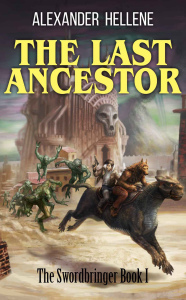Writing Non-Fiction Is Harder Than Writing Fiction

If the movie The Princess Bride is to be trusted–and it is–there are two classic blunders:
Never get involved in a land war in Asia; and
Never go against a Sicilian when death is on the line.
I would add a third, and that is Never try to write a fiction and a non-fiction book at the same time.
I made this blunder when I decided to write a book about prog-rock legends Rush, Dreamers and Misfits, while finishing The Second Sojourn. Work on The Second Sojourn slowed down as I worked on Dreamers and Misfits. I reversed this to finish The Second Sojourn, and once that was shipped to my editor, I threw myself into Dreamers and Misfits. Now that I have The Second Sojourn back from my editor . . . I’ve let her edits sit there for about a month while I finish Dreamers and Misfits.
Let me tell you, writing non-fiction is hard. It is harder and more time-consuming than writing fiction. It’s fun and it’s rewarding, but it’s tough. It’s taking me back to grad school, actually, what with all the research and note-taking and . . . you know what? This is one of those instances where a list would suffice.
Research. The fun thing about non-fiction is that you can give your opinion. The time-consuming thing is that, if you want your opinions to have credibility, you need sources for many of your assertions. Not all, of course. Your opinion is your opinion, and the only citation you need is “My brain.” But sources to back up opinions, especially controversial or novel ones, help move them beyond the realm of speculation or hypothesizing and into the realm of cold, hard reality. And if you’re trying to write about stuff other people have said or done, or use ideas other people have already had, then you absolutely need citations . . . unless you’re cool with being regarded as either a liar or a plagiarist.
Videos. Research involves a lot of reading, but you can cut and paste reading if it’s online. Not so much with video interviews and documentaries. For these, unless you’re lucky enough to find a transcript, you need to listen over and over to make sure you’re transcribing it just right. It’s more of a pain in the neck than it sounds.
Structure. Fiction requires structure, of course, but you can play around with it. Non-fiction is different. Non-fiction requires a logical, step-by-step, and some may say hand-holding structure as you guide the reader through your argument, first to your thesis statement or subject, and then through whatever information you use to convey that point, and finally to a conclusion. It sounds simple, but it’s not. In non-fiction, you are constructing an argument, which has a different flow than the narrative of a story. I mean, good non-fiction also tells a story, but you do not do it through dialogue and action. You do it through information and opinion. This is a different type of narrative which requires a different set of tools. Time-consuming tools.
Format. You need to cite things, and citing things requires consistency. Whatever citation style you choose–I prefer footnotes–use it exclusively. However, you want to get the citations right. This means making sure that, if you’re quoting something, you aren’t quoting Person A quoting what Person B said to Person C. You want to go as close to the source as you can.
Tables and Graphs. Dreamers and Misfits makes extensive use of a Rush fan survey I made public back in February. I decided that, to show my work and provide interesting information to my readers, I would include selected portions of the survey results. Mind you, I had over 650 people respond. That’s a lot of information to edit and format in a way that is readable. By the way, Microsoft Excel is awful.
Interviews. I did two interviews–one with legendary former DJ and current professor and media historian Donna Halper (the woman who broke Rush in the United States) and one with Ed Stenger, proprietor of one of the biggest and best Rush blogs, RushIsABand.com. These take time to transcribe, or cost money if you use a transcription service. Rev is a good one. It’s a phone recording app that also transcribes your interviews for a modest fee. After transcribing my first interview by hand, I decided to take Rev up on their offer for the second, and I think that’s the way I’ll be going for the next few backer fan interviews I’ll have to do.
So there you have it. I have learned that writing non-fiction is difficult but incredibly fun, especially when it’s about a topic I’m passionate about . . . like Rush and their fans. I’ve also learned that I do not have the bandwidth to write two big books at the same time. Some people do, and that’s great. Some people don’t, and that’s the bucket I fall in.
Anyway, I’ll have this book done soon. Contribute to the IndieGoGo campaign here (we’re over halfway there!) and keep on rocking.
My fiction is also awesome, fun, and rewarding. If you like Rush, you’ll love The Last Ancestor. Buy it here!




